De Nederlandse dichteres Hester Knibbe werd geboren op 6 januari 1946 in Harderwijk. Zie ook alle tags voor Hester Knibbe op dit blog.
En hij bestond
En hij bestond. We pakten hem
op, zwierden hem in het rond en
nog eens en hij kraaide want hij was
in lievelingshanden en toen was het
hup de wereld in met je hart
dat men afpakken kan, kan breken
in een hoek smijten: niks waard zo’n
hart geen porselein of goud, meer een roestig
soort klei en je hebt er zoveel van, ook het jouwe
gaat straks op de schroothoop. Maar hij
wilde niet weg, hij wilde
groeien en blijven waar het goed was en goed
wilde hij worden met vileine streken. Schulp
is een woord als schuld, de kom waarin elk
rondkruipt, telkens opnieuw het lichaam
verkent: ben ik dat, een soort groot
gebaar waarmee ik soms iemand
in het gezicht sla?
Thuiskomst
Ik droomde dat ik van je
droomde: we zaten op de bank en
praatten wat, je droeg de trui die ik
die dag gedragen had, je haar was
nat van alle regen. Je lijf solide
warm had weer de frisheid van
wanneer je in de grienden was geweest
en je vertelde feestelijk gewoon
dat het daarginds toch anders
bleek, hoe diep de wortels
reiken van de eik. En ik
verhaalde van wat ik hierboven
had geleefd, over het groeien van
de hazelaar, ook een bijzonder rijk
spinnenjaar zei ik. Je schaterlachte.
Domein
Voor Anke
Dit is je grondgebied, vruchtbaar
maar afgemeten. Zet hier je paden uit,
de smalle en de brede. Stenen
zijn inclusief, grenzen staan
vast. Mijd Eden. Die hof lijkt
uitgediend; de boom die in het midden
staat, kraakt onder vrucht en blad,
muurvast dringt het seizoen
rond het verleden. Blijf ervan
af. Schaf schoenen aan, ga
stevig stap voor stap.
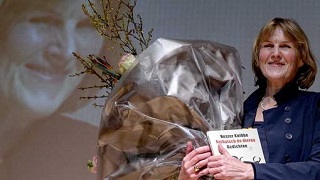
Hester Knibbe (Harderwijk, 6 januari 1946)
De Libanese dichter en romanschrijver Khalil Gibran werd geboren op 6 januari 1883 in Bischarri. Zie ook alle tags voor Khalil Gibran op dit blog.
On Pain
Your pain is the breaking of the shell that encloses
your understanding.
Even as the stone of the fruit must break, that its
heart may stand in the sun, so must you know pain.
And could you keep your heart in wonder at the
daily miracles of your life, your pain would not seem
less wondrous than your joy;
And you would accept the seasons of your heart,
even as you have always accepted the seasons that
pass over your fields.
And you would watch with serenity through the
winters of your grief.
Much of your pain is self-chosen.
It is the bitter potion by which the physician within
you heals your sick self.
Therefore trust the physician, and drink his remedy
in silence and tranquillity:
For his hand, though heavy and hard, is guided by
the tender hand of the Unseen,
And the cup he brings, though it burn your lips, has
been fashioned of the clay which the Potter has
moistened with His own sacred tears.
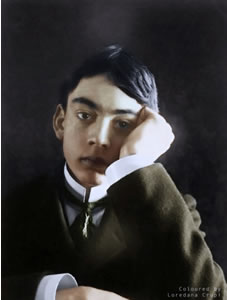
Khalil Gibran (6 januari 1883– 10 april 1931)
Foto door F. Holland Day, ca. 1896 ~ Ingekleurd door Loredana Crupi
De Franse schrijver Romain Sardou werd geboren op 6 januari 1974 in Boulogne-Billancourt. Zie ook alle tags voor Romain Sardou op dit blog.
Uit: Pardonnez nos offenses
“Haquin résuma sommairement l’histoire des Pères de l’Eglise qui charpentèrent la pensée chrétienne. Ils étaient tous de formation hellénique. Après leur conversion à Jésus, ils s’appliquèrent à « reformuler » les grands systèmes philosophiques grecs selon une terminologie de chrétiens, éclairés par leur foi nouvelle et enrichis de l’expérience du Christ. Ce labeur, qui nécessita des générations d’études, fut une épreuve intellectuelle sans égal. Les assimilations, souvent improbables, ne manquèrent pas de révéler des « erreurs » chez les philosophes antiques comme des « lacunes graves » dans le dogme chrétien en plein essor. L’œuvre de Saint-Augustin, par exemple, se constitua sur la christianisation de la pensée de Platon. Entre les lignes, entre les Idées, au détour d’un doute de Socrate, le grand évêque d’Hippone retrouvait les valeurs, les choix et les messages édictés farouchement par l’Eglise. De la même façon, beaucoup d’auteurs antiques se retrouvèrent chrétiens sans avoir jamais connu le Fils. Ceux qui résistaient à tout rapprochement étaient simplement mis à l’index, considérés comme inexacts ou hérétiques.
– C’est du reste une époque très intéressante que nous vivons en ce moment, ajouta Haquin. L’Eglise s’est longtemps contentée de sa victoire exceptionnelle sur le platonisme, sans se soucier du premier de ses adversaires : l’école d’Aristote, le disciple même de Platon.
(…)
Depuis lors, continua Haquin, nous essayons de faire avec Aristote ce qu’Augustin et les Pères ont fait avec Platon. Malheureusement, la pensée d’Aristote est autrement plus complexe et plus éloignée de nous que celle de son aîné. Elle est presque en tous points opposée aux fondamentaux de notre foi.
— Alors pourquoi s’en soucier ? demanda Chuquet. Faisons comme avec les autres penseurs antiques non retenus par nos Pères ignorons-là. Nous pouvons déclarer qu’Aristote est un hérétique, et vivre sans lui comme nous l’avons déjà fait. N’a-t-on pas écarté des textes de l’évangéliste Jean ? »
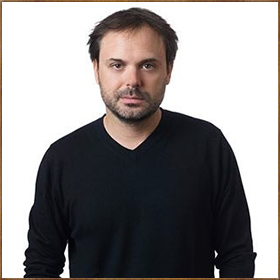
Romain Sardou (Boulogne-Billancourt, 6 januari 1974)
De Amerikaanse dichter Carl Sandburg werd geboren op 6 januari 1878 in Galesburg, Illinois. Zie ook alle tags voor Carl Sandburg op dit blog.
Fog
The fog comes
on little cat feet.
It sits looking
over harbor and city
on silent haunches
and then moves on.
Timesweep
I was born in the morning of the world,
So I know how morning looks
morning in the valley wanting,
morning on a mountain wanting.
Morning looks like people look,
like a cornfield wanting corn,
like a sea wanting ships.
Tell me about any strong, beautiful wanting,
And there is your morning, my morning,
everybody’s morning.
Mascots
I will keep you and bring hands to hold you against a great hunger.
I will run a spear in you for a great gladness to die with.
I will stab you between the ribs of the left side with a great love worth remembering.
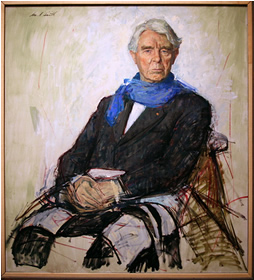
Carl Sandburg (6 januari 1878 – 22 juli 1967)
Portret door William Arthur Smith, 1961
De Duitse schrijver Jens Johler werd geboren op 6 januari 1944 in Neumünster. Zie ook alle tags voor Jens Johler op dit blog.
Uit:Ein Essen bei Viktoria
„Es war eine Nichtigkeit, die dazu führte, daß ich mich mit Erasmus überwarf. Es ging um einen Dollar.
Wie ist es möglich, fragte ich mich damals, daß zwei Freunde wie wir, und noch dazu auf einer solchen Reise, einer Amerikareise, sich wegen eines Dollars in die Haare kriegen? Inzwischen glaube ich zu wissen, woran es lag. Ich glaube, es lag. daran, daß wir keine Freunde waren. Erasmus hatte das immer behauptet, ich hatte ihm nur nicht geglaubt. Aber hatte er es selbst geglaubt? Und wenn ja, wieso ist er mit mir nach Amerika gefahren? Schon als er mir die Reise vorschlug, hätte ich wissen müssen, daß es schiefgehen würde. Es mußte schiefgehen. Wenn man so über die Menschen redet wie Erasmus, dann muß man ihnen aus dem Wege gehen und darf mit ihnen nicht verreisen. Man dürfte nicht einmal mit ihnen essen gehen.
Wir gingen häufig miteinander essen. Es gab niemanden, mit dem ich das so gern tat wie mit Erasmus. Nicht, weil wir beide Gourmets wären, ich bin kein Gourmet. Ich esse, was auf den Tisch kommt. Es gibt zwar Speisen, die ich aus irgendeinem Grunde nicht mag, aber die kommen auch nicht auf den Tisch, weil ich sie nicht bestelle. Austern, Schnecken, Kutteln oder Hirn bestelle ich nicht, so sehr auch andere davon schwärmen mögen. Auch zu Kaviar habe ich nie einen Zugang finden können. Ich weiß nicht, was Erasmus von Kaviar hält, ich habe ihn nie gefragt, aber ein Gourmet ist er auch nicht. Ihm schmeckt nämlich alles. Was für ein Vergnügen, mit ihm zu essen! Sein immer guter Appetit steckt einen an, er futtert drauflos wie ein Weltmeister und strahlt dabei eine Lebensfreude aus, um die man ihn beneidet.“
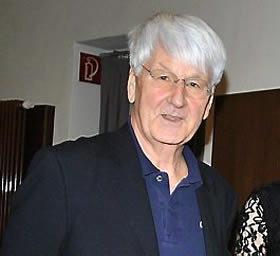
Jens Johler (Neumünster, 6 januari 1944)
De Amerikaanse schrijver Edgar Laurence Doctorow werd geboren op 6 januari 1931 in New York. Zie ook alle tags voor E. L. Doctorow op dit blog.
Uit: Ragtime
“His life was absurd. He went all over the world accepting all kinds of bondage and escaping. He was roped to a chair. He escaped. He was chained to a ladder. He escaped. He was handcuffed, his legs were put in irons, he was tied up in a strait jacket and put in a locked cabinet. He escaped. He escaped from bank vaults, nailed-up barrels, sewn mailbags; he escaped from a zinc-lined Knabe piano case, a giant football, a galvanized iron boiler, a rolltop desk, a sausage skin. His escapes were mystifying because he never damaged or appeared to unlock what he escaped from. The screen was pulled away and there he stood disheveled but triumphant beside the inviolate container that was supposed to have contained him. He waved to the crowd. He escaped from a sealed milk can filled with water. He escaped from a Siberian exile van. From a Chinese torture crucifix. From a Hamburg penitentiary. From an English prison ship. From a Boston jail. He was chained to automobile tires, water wheels, cannon, and he escaped. He dove manacled from a bridge into the Mississippi, the Seine, the Mersey, and came up waving. He hung upside down and strait-jacketed from cranes, biplanes and the tops of buildings. He was dropped into the ocean padlocked in a diving suit fully weighted and not connected to an air supply, and he escaped. He was buried alive in a grave and could not escape, and had to be rescued. Hurriedly, they dug him out. The earth is too heavy, he said gasping. His nails bled. Soil fell from his eyes. He was drained of color and couldn’t stand. His assistant threw up. Houdini wheezed and sputtered. He coughed blood. They cleaned him off and took him back to the hotel. Today, nearly fifty years since his death, the audience for escapes is even larger.”
E. L. Doctorow (6 januari 1931 – 21 juli 2015)
Zie voor nog meer schrijvers van de 6e januari ook mijn blog van 6 januari 2015 deel 2 en ook mijn blog van 6 januari 2014 deel 1 en 2 en eveneens mijn blog van 6 januari 2013 deel 2.
